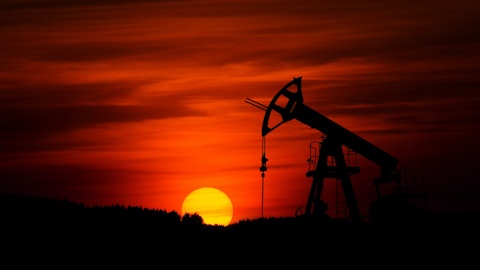Francisco Leon: Yes. No, Kalei. We have — definitely, we’ve taken a lot of cost over the last couple of years. And we’ll continue to be focused on cost. We did see, like everybody else, inflationary pressures and those inflationary pressures that are driving cost in the business need to be offset so that we can maintain the margins. So I think we’re just committed to continue to evaluate cost in a year like this year where we’re guiding to lower production, we need to align that cost structure to the production, right? That’s kind of — that’s what we’re saying, but it’s obviously a focus on cost. It’s just for the long-term viability of the business, something that we always do.
Kalei Akamine: What is the sustaining CapEx at the moment?
Francisco Leon: Say it again, what was the — if you don’t mind, again.
Kalei Akamine: What is sustaining CapEx, the capital needed to hold the business — hold production flat?
Francisco Leon: Yes. Well, we wish to hold the — and then there’s different moving parts. There’s OpEx and CapEx that ultimately helps us keep production flat. But what we said is about $300 million keeps production flat entry to exit. And this program is, like we said, more of a run rate, and that’s what we’re seeing — we’re guiding to a 5% to 7% decline.
Kalei Akamine: Got it. My second question is on the Huntington Beach monetization. So pre-bankruptcy the thought was that this land was worth about $1 billion, less remediation cost. What do you think that net value is today? And what is the pathway to readying that asset for sale and ultimately executing on the sale?
Francisco Leon: Yes. Yes, there’s a lot in that question. And I think what we’ve answered in the past is, we’re focused on a smaller property and because there’s a lot of things to work through as we sell assets, but we have a fantastic real estate portfolio or assets that can be turned into real estate or in Elk Hills, for example, it’s the mid-tier industrial park. So we can do a lot with our fields. The Huntington Beach Field is the largest, probably most attractive piece of that portfolio from a future development. But what we’re doing there is we’re starting abandonment. We started the entitlement process, which is needed to change the surface use to the most appropriate and best use going forward. We’re still producing oil, and it’s a very valuable, very profitable field.
So we’re taking the steps. We’re trying to assess where to go. But right now, we’re focused on monetizing the smaller property that ultimately helps inform the plans for the bigger piece of land.
Kalei Akamine: Do you think it’s going to be difficult to get the rights to change the use of that land from oil and gas production to commercial development or real estate?
Francisco Leon: We don’t know. I mean it happens a lot in California. You can look — Kalei, there’s a number of big developments, land that’s been used for some for oil, some for other purposes. And you can see these projects get done, but it’s — the time line is variable, and that’s the work that we were starting to do.
Kalei Akamine: Francisco, congratulations for both of you guys.
Francisco Leon: Thanks Kalei.
Mark McFarland: Thank you.
Operator: Our next question comes from Eric Seeve from GoldenTree.





